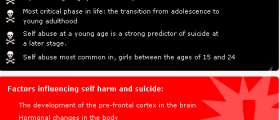
Overview
Individuals who suffer from depression are more likely than the general population to commit suicide. Recognizing the signs of deep major depression and suicidal behavior can help in preventing the person from taking their own life. Simple things anyone can do include talking about it with the person who is hurting and trying to understand their emotions. It is also strongly advised that individuals ask for clinical assistance if they have a friend or a family member who might be contemplating suicide. A strong support system composed of loved ones is crucial when it comes to aiding a person who is battling depression. It is estimated that around 1 million individuals die annually from suicide. Those who are having suicidal thoughts usually feel desperate, hopeless, and alone, and do not believe things will get any better in the future. The only possible way out is through death. In addition, studies have shown that people who have committed suicide did look for clinical assistance, but were still unable to overcome their problems. Finding appropriate psychiatric care providers would save many lives as even those persons who are severely depressed do not wish death upon themselves. Also, statistical data reveals that the majority of those who do eventually commit suicide have spoken to someone close about it or revealed their intentions in some other way. Paying attention to the warning signs can stop an individual from killing him or herself. Lastly, those who do commit suicide are in many cases clinically sane people.
Spotting the Signs
As already mentioned, in many cases there have been cries for help of various intensities from persons who commit suicide. In instances in which an individual openly talks about the depression and hopelessness family and friends need to show love, support, and understanding in order to help. Seeking professional assistance is always recommended even though the person has never been diagnosed with a mental illness. The most obvious signs include death obsession, as well as researching and talking about the ways in which one could commit suicide. In case an individual does in fact have a psychiatric diagnosis such as bipolar disorder, borderline personality disorder or depression the signs are usually more visible and the possibility of going through with killing oneself higher. Further, feeling hopeless and sure in the fact that the current situation will never change is another strong predictor of suicide. People who are suicidal believe that they would not be missed as well that they are worth nothing. Other kinds of signs consist of giving belongings away, preparing a will, and avoiding any social contact. Lastly, people who are likely to take their own lives engage in reckless behavior such as drug and alcohol abuse, unprotected sex, and so on. As is the case with psychological disorders, an individual who is suicidal loses interest in activities that were previously enjoyed, suffers from appetite and sleep problems, and is prone to sudden mood changes, such as going from deep depression to hypermania.
Offer Help and Support
Dealing with an individual who is exhibiting the signs of suicide can be particularly challenging. It is crucial that those who are close are able to communicate their worries openly. Troubled people are in a desperate need of attention, love, and appreciation, so even if one makes a mistake thinking their friend or family member is suicidal there is no harm in asking. By providing a positive, nurturing environment it is possible to save a life. It is also important to find out when the first thoughts of suicide occurred as well as to offer unconditional help. Showing to the troubled person that he or she is not abandoned, and trying to make them realize things always change may influence them in a positive way. It is also important to talk openly and honestly, as well as to listen intently. Attempting to understand their feelings and offering hope is likely to assist.
Risk Factors
Although there are many suicidal individuals who are not affected by clinical disorders, there are those who suffer from one or more psychological condition which makes them more prone to suicide. For instance, substance abuse problems, psychosis, depression, and bipolar disorder have all been known to lead to suicide. Further, anyone who has attempted suicide in the past or who has a family history of suicide is more likely to try it again compared to the members of the general population. Suicide is also more prevalent among teenagers and older adults than other age groups. Misbehaving in teenagers, coupled with social isolation and abuse are strong predictors of suicide. In addition, anyone who has recently started taking antidepressants or whose dosage has been altered should be watched carefully as well. Individuals who are battling terminal illnesses or who have suffered major trauma are also at risk.

















Your thoughts on this
Loading...